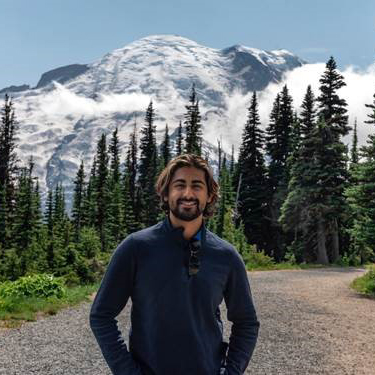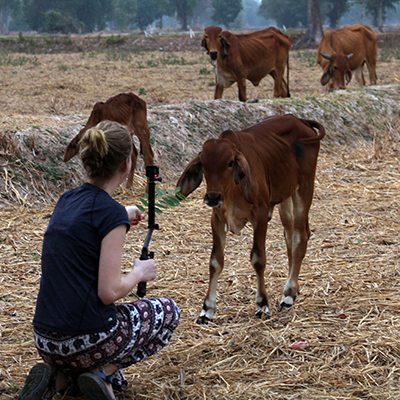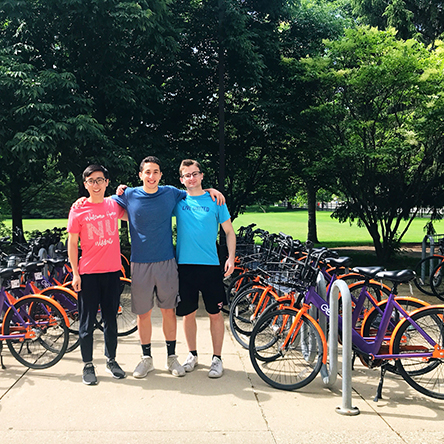Sustainable Energy Infrastructure for Ethiopian Education
Northwestern partners with Haile-Manas Academy on solar water heater project with $25k in support from the Resnick Family Social Impact Program
2019 Resnick Family Social Impact Fund Recipients Announced
Prototypes. International partnerships. Collaboration across disciplines. These are some of the factors that came together for academic teams that earned funding from the Resnick Family Social Impact Program. Administered by the Paulra M. Trienens Institute for Sustainability and Energy at Northwestern, the Resnick Program supports projects that address significant local and global challenges in sustainability and energy. Generous funding from Paula Stamler Resnick (WCAS ’86) and Ira Resnick makes the program possible.
Meet this year’s recipients and read about their inspiring work.
 David Costello (KSM ’19) could taste success from the moment he decided to develop a line of sustainable footwear. On the first day of New Venture Discovery class in the Spring of 2018, he successfully pitched his idea to his classmates, earning a team of four collaborators who came together to help make his dream a reality.
David Costello (KSM ’19) could taste success from the moment he decided to develop a line of sustainable footwear. On the first day of New Venture Discovery class in the Spring of 2018, he successfully pitched his idea to his classmates, earning a team of four collaborators who came together to help make his dream a reality.
“The particular problem we are solving for is waste in the footwear industry,” he explains. Adding that the average shoe takes from 35 to 40 years to break down in a landfill, according to the US Department of the Interior. “This was the problem I specifically wanted to go after,” says Costello, who is motivated by the environmental aspect of his work. The team began “looking to innovate on the materials side of things and bring together a combinations of materials that wear out slow but break down fast.”
Work continued after the quarter ended. In addition to expanding his team, Costello found support through a range of courses and programs at Northwestern, including the Zell Fellowship program at the Kellogg School. Costello spent time with designers and factories from Chicago’s School of Shoemaking to a cork producer in Portugal. The result? A shoe that is 95% plant based. Scoots’ product development work and part of its promotional work was funded by the Resnick program.
The first round of shoes became available via a Kickstarter campaign in June, and remained available into early July. The upper is made largely of pineapple fibers, and the bottom mainly of cork. After graduation, Costello plans to continue to refine the product and materials until it is 100% compostable. Scoots is now seven employees strong including Kellogg School graduates of the Class of 2019: Peps Bengzon, Laurel Chamberlin, Jess Hsueh, and Thomas Schanzer. Additional teammates include Wendy Kadon, Kellogg Class of 2020; and Sarah Han, an undergraduate student with Medill. “The progress that we’ve made in a short amount of time wouldn’t have been possible with the great people working with me,” says Costello, who anticipates a full scale launch in the fourth quarter of 2019.
 Industrial engineering major Saif Bhatti earned funding from the Resnick program to support his travel to South Africa this summer, where he will test technology he developed to alert park rangers of wildlife poaching activities in large natural areas. A rising senior, Bhatti is taking previous advancements in the field to a new level by working with microprocessors rather than cell phones to relay information across a wider geographic range than was previously possible. Working with a linear programming language he learned in his engineering courses, Bhatti developed a model to guide the placement of sound-monitoring technology across an area such as a national park. He also designed audio-processing scripts to distinguish between the types of audio signals that may exist in such a location in order to improve the accuracy of the system.
Industrial engineering major Saif Bhatti earned funding from the Resnick program to support his travel to South Africa this summer, where he will test technology he developed to alert park rangers of wildlife poaching activities in large natural areas. A rising senior, Bhatti is taking previous advancements in the field to a new level by working with microprocessors rather than cell phones to relay information across a wider geographic range than was previously possible. Working with a linear programming language he learned in his engineering courses, Bhatti developed a model to guide the placement of sound-monitoring technology across an area such as a national park. He also designed audio-processing scripts to distinguish between the types of audio signals that may exist in such a location in order to improve the accuracy of the system. A team of undergraduate students enrolled in the winter/spring 2019 Segal Design Institute’s Interdisciplinary Design Projects I course were supported by the Resnick program for their fieldwork in Sisaket, Thailand to test sustainable alternative cattle herding practices. Early in the quarter, the team set out to design a high-visibility product to prevent cattle related accidents on roads and other locations, and to produce a virtual fencing system to increase control and monitoring of cattle movement. The product also had to work within the environmental, cultural, and geographic specifications of the location.
A team of undergraduate students enrolled in the winter/spring 2019 Segal Design Institute’s Interdisciplinary Design Projects I course were supported by the Resnick program for their fieldwork in Sisaket, Thailand to test sustainable alternative cattle herding practices. Early in the quarter, the team set out to design a high-visibility product to prevent cattle related accidents on roads and other locations, and to produce a virtual fencing system to increase control and monitoring of cattle movement. The product also had to work within the environmental, cultural, and geographic specifications of the location. Jacob Gutstein, Drake Weisman, and Dan Weiss have been on a roll since they co-founded eo, a campus bikeshare program, last March in their NUvention: Innovate for Impact course with the Farley Center. Rising seniors Gutstein, an engineering major; Weisman, an economics major; and Weiss, an applied math and economics double major, have been hard at work ever since. They work closely with team members Grace Jaeger, a rising junior and journalism major; and James Jia, a rising sophomore and industrial engineering and management sciences major.
Jacob Gutstein, Drake Weisman, and Dan Weiss have been on a roll since they co-founded eo, a campus bikeshare program, last March in their NUvention: Innovate for Impact course with the Farley Center. Rising seniors Gutstein, an engineering major; Weisman, an economics major; and Weiss, an applied math and economics double major, have been hard at work ever since. They work closely with team members Grace Jaeger, a rising junior and journalism major; and James Jia, a rising sophomore and industrial engineering and management sciences major.